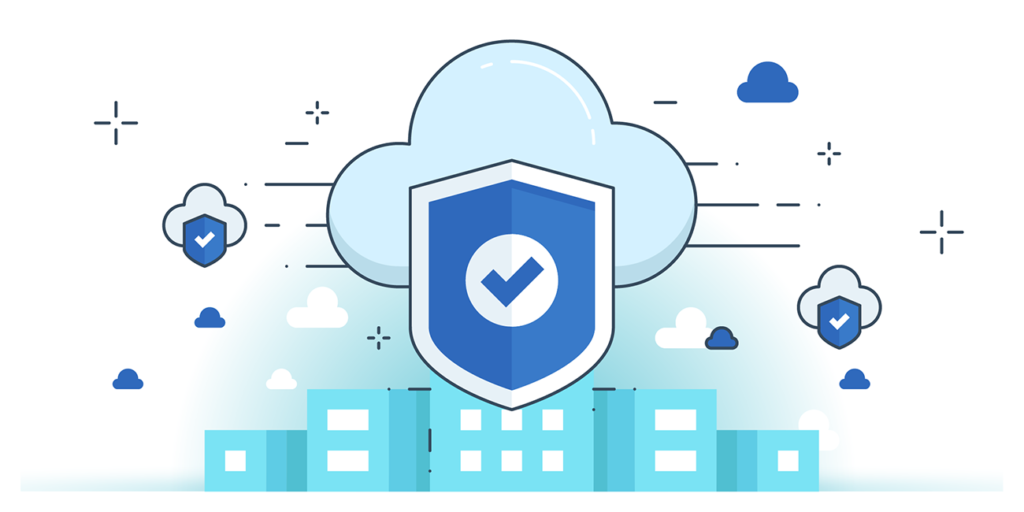Enhancing Cloud Security: From Threats to Trust
Discover how businesses can effectively mitigate risks and threats in the cloud through the implementation of robust cloud security architecture. Cloudologix offers cutting-edge solutions that enhance confidentiality, integrity, and availability of cloud platforms, enabling businesses to establish trusted environments and unlock exceptional value. Explore the key benefits of leveraging Cloudologix technologies and safeguard your valuable assets in the cloud with confidence.
“Empowering Businesses with Cloud Security Architecture: Reducing Risks and Ensuring Trust with Cloudologix Solutions”
What Is Cloud Security Architecture?
As more and more organizations adopt cloud computing for their IT infrastructure, the importance of cloud security has become increasingly apparent. Cloud security is the set of practices, policies, and technologies that protect cloud-based systems, applications, and data from unauthorized access, theft, or damage.
Cloud security architecture describes all the hardware and technologies designed to protect data, workloads, and systems within cloud platforms. Developing a strategy for cloud security architecture should begin during the blueprint and design process and should be integrated into cloud platforms from the ground up. Too often, cloud architects will focus entirely on performance first and then attempt to bolt security on after the fact.

Essential Pillars of Cloud Security
Secure cloud computing architecture encompasses three core capabilities: confidentiality, integrity, and availability. Understanding each capability will help guide your efforts in planning a more secure cloud deployment.
- Confidentiality is the ability to keep information secret and unreadable to the people who shouldn’t have access to that data, such as attackers or people inside an organization without the proper access level. Confidentiality also includes privacy and trust, or when a business pledges secrecy in handling their customers’ data.
- Integrity is the idea that the systems and applications are exactly what you expect them to be, and function exactly as you expect them to function. If a system or application has been compromised to produce an unknown, unexpected, or misleading output, this can lead to losses.
- Availability is the third capability and is generally the least considered by cloud architects. Availability speaks to denial-of-service (DoS) attacks. Perhaps an attacker can’t see or change your data. But if an attacker can make systems unavailable to you or your customers, then you can’t carry out tasks that are essential to maintain your business.

Why Is Cloud Security Architecture Important?
The cloud, whether it’s private cloud, public cloud, or hybrid cloud, holds the promise of agility, efficiency, and cost effectiveness. These are transformational qualities for any business, and they enable organizations to adapt to market changes with rapid services delivery and the ability to make data-informed decisions. However, businesses may be prevented from using cloud resources without exposing themselves and their data to risk. Cloud security architecture allows businesses to take advantage of all that the cloud offers—including software as a service (SaaS), platform as a service (PaaS), and infrastructure as a service (IaaS) offerings—while mitigating exposure and vulnerability. Without cloud security architecture, the risks associated with using the cloud could outweigh any potential benefit.
Cloud Security Architecture Threats
While planning your cloud deployment, you want to be prepared for common threats such as malware and privilege-based attacks. There are too many common threats to enumerate here, so instead this article will provide a snapshot of high-profile threats that industry experts are thinking about right now.
- Insider threats include both workers within your own organization who have access to systems and data and also cloud service provider (CSP) administrators. When you subscribe to CSP services, you are essentially entrusting your data and workloads to the multitude of staff who are responsible for maintaining the CSP architecture. Another consideration is whether data is accessible to governmental entities. Security experts are paying more attention to the laws, regulations, and real-life practices that demonstrate whether a government can use court orders or other means to gain access to data in a private or public cloud.
- DoS attacks are a huge area of focus. Temporary direct denial-of-service (DDoS) attacks typically involve hammering a system with requests until it shuts down. Security perimeters can deflect these attacks using network compliance policies to filter out repeated requests. CSPs can also shift workloads and traffic to other resources while they work to restore the system. Permanent DoS attacks are more destructive and often inflict damage at the firmware level to render a server unbootable. In this case, a technician needs to physically reload the firmware and rebuild the system from scratch, which can result in servers being shut down for days or weeks.
- The cloud edge can refer to cloud-connected edge systems, but for a CSP it also refers to server architecture that is not under the CSP’s direct control. Global CSPs cannot build and run their own facilities in every corner of the planet, so they rely on partners to deliver services to smaller, geographically isolated, or rural regions. As a result, these CSPs don’t have total control to monitor and ensure physical box integrity for the hardware or physical attack protections such as locking down access to USB ports.
- Customer control influences how customers evaluate public cloud offerings. From the customer perspective, users are nervous about moving sensitive workloads to the public cloud. On the other hand, big cloud providers are typically much better equipped and have a much higher level of expertise in cloud security than the average enterprise running a private cloud. Generally, customers find it reassuring to be in total control of their most sensitive data, even if their security tools aren’t as sophisticated.
- Hardware limitations mean that even with the most robust cloud security architecture in the world, a server can’t help you create a better password. Passwords are one of the most common vectors of attack. Cloud security architects are focused on hardware, firmware, and software protections, but it will still fall on the shoulders of everyday users to follow best practices.
How Cloudologix can help you in Cloud Security ?
At Cloudologix, we are at the forefront of cloud security, dedicated to providing industry-leading solutions and services to protect your valuable data in the cloud.
- Cutting-Edge Technologies: We leverage the latest advancements in cloud security technologies to ensure the highest level of protection for our clients. Our team continuously evaluates and adopts innovative tools and techniques to stay ahead of emerging threats.
- Customized Security Strategies: We understand that every organization has unique security requirements. That’s why we work closely with our clients to assess their specific needs and develop tailored security strategies that align with their business goals and compliance regulations.
- Expert Team: Our team of experienced cloud security professionals possesses in-depth knowledge and expertise in securing cloud environments. They stay up-to-date with the latest security trends, emerging threats, and industry best practices to provide comprehensive protection for your cloud-based systems and data.
- Proactive Security Measures: We believe in taking a proactive approach to cloud security. Through regular security assessments, we identify vulnerabilities and potential risks in your cloud infrastructure. Our team then implements robust security controls and measures to address these risks before they can be exploited.
- Continuous Monitoring and Incident Response: Our dedicated security operations center (SOC) monitors your cloud environment 24/7, detecting and responding to security incidents in real-time. We leverage advanced security monitoring tools and techniques to ensure early threat detection and prompt mitigation.
- Compliance and Regulatory Adherence: We understand the importance of compliance and regulatory standards in various industries. Our security solutions are designed to meet the requirements of major compliance frameworks such as HIPAA, PCI-DSS, and GDPR, ensuring your organization remains compliant with relevant regulations.
- Employee Training and Awareness: We believe that security is a shared responsibility. We provide comprehensive security training programs to educate and empower your employees. By raising awareness about security best practices and potential threats, we ensure that your workforce becomes a strong line of defense against cyberattacks.
- Business Continuity and Disaster Recovery: Our robust disaster recovery and business continuity plans are designed to minimize downtime and ensure the continuity of your operations. We have redundant systems in place, along with tested backup and recovery procedures, to swiftly recover from any disruptions and protect your business interests.
At Cloudologix, we prioritize your cloud security needs and work tirelessly to deliver effective solutions. Partner with us to enhance your cloud security posture, mitigate risks, and gain peace of mind knowing that your data is protected by industry-leading experts in cloud security.
Conclusion
Cloud security is a complex and constantly evolving field, but it is essential for organizations that want to take advantage of the benefits of cloud computing while minimizing their risks. By implementing strong security measures and following best practices, organizations can protect their cloud-based systems, applications, and data from unauthorized access, theft, and damage.
